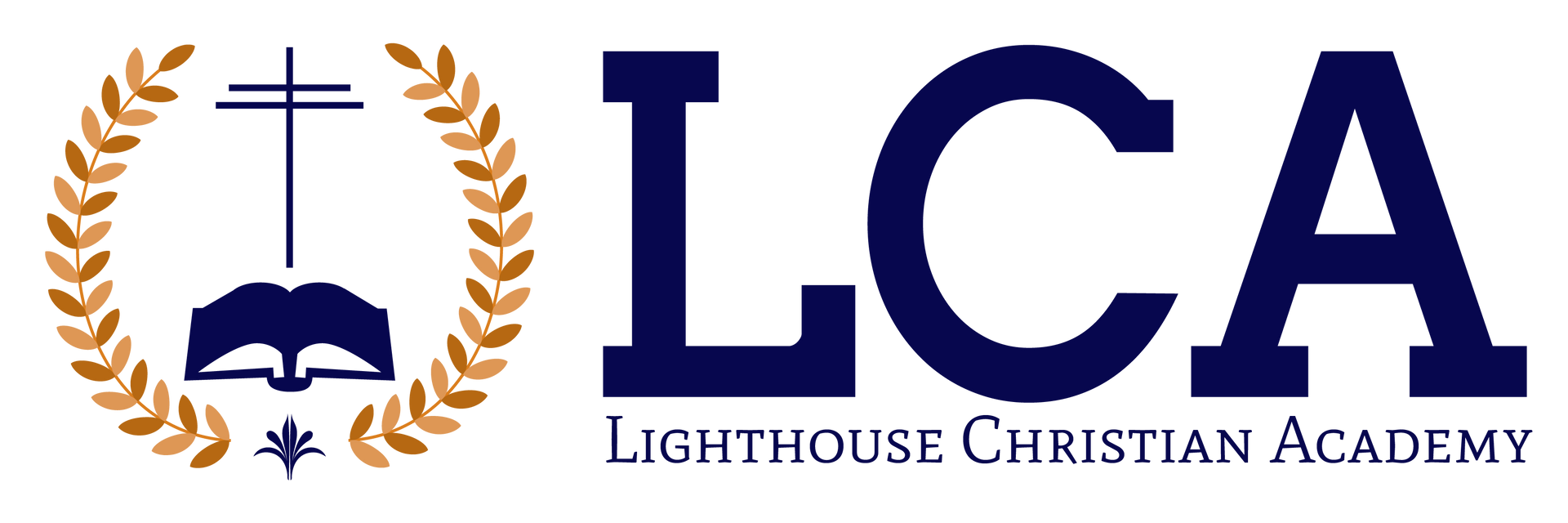How we do it
Academics
How we teach
Our curriculum combines aspects of many core academic traditions
As Christians, we believe that all children are created in the image of God and have the potential to learn and grow. We also believe that education is a gift from God, and that it is our responsibility to help our children develop their God-given talents and abilities.
The Lighthouse Christian Academy (LCA) curriculum is designed to provide students with a well-rounded education that is grounded in the Bible. The curriculum is based on the Accelerated Christian Education. A.C.E. School of Tomorrow®, which is a self-paced, mastery-based program that allows students to learn at their own pace.

The curriculum emphasizes critical thinking, problem solving, and communication skills. In addition, the curriculum teaches students about the importance of character, integrity, and service.
It was a wide range of subjects, including math, science, English, history, Bible, and Etymology. In addition to these core subjects, LCA also offers a variety of electives, such as accounting, health, and foreign language.
We are committed to providing a quality education that is grounded in the Bible. If you are looking for a school that can provide your child with a quality Christian education with an emphasis on growth mindset, helping students develop strong interpersonal skills, and strong student-centered learning, then LCA is the right choice for you and your family.
Benefits to Our Curriculum
As a teacher and parents ourselves, we have heard many parents say that their children never used to like school, but now they cannot wait to begin with their new day's goals with LCA.
This is because our program is designed to be engaging and interactive, while also covering the critical outcomes and minimum standards of education. All teaching materials are self-instructional, saving hours of preparation. This means that w can spend more time focusing on your child/our student and helping them reach their full potential.
Unlike a classroom setting where a teacher lectures the students, A.C.E.’s curriculum allows students to read the material for themselves, answer questions, and then test comprehension of the subject. Whether the student is a high achiever or a moderately-paced learner, the A.C.E. curriculum progresses at the exact level of the child’s ability.
Character traits like kindness, loyalty and honesty are taught within the curriculum, whether it is Math, English, History, or other subjects. The student can observe Godly living in the Christian character illustrations and then apply the lessons to his/her own life.
Students are taught to see life from God’s point of view, to take responsibility for their own learning and to walk in wisdom.
Truly individualized – accommodating the needs of each child
Diagnostic testing identifies learning gaps
Students take responsibility for their own learning
Built on a values-based and principled ethos
All learning materials are self-instructional

Accelerated Christian Education (ACE) has taken the traditional textbook and broken it down into smaller, more manageable units called PACEs. Each PACE is equivalent to a unit in a textbook, and each level consists of 12 PACEs per subject.
Full-color explanations and illustrations add excitement to each lesson, and innovative learning activities reinforce the interesting text material. Throughout the program, the introduction of new vocabulary words is carefully controlled so that no word is used without the learner first learning its meaning and pronunciation.
The Bible-based PACEs integrate character-building lessons into the academic content and are carefully designed to develop critical thinking skills.
If you are looking for a Bible-based curriculum that is both engaging and effective, then ACE PACEs may be a good option for you.
What is a PACE?
PACE is an acronym that stands for Packet of Accelerated Christian Education. A.C.E. School of Tomorrow® has taken the conventional-style textbook and divided it into bite-sized, achievable booklets called PACEs. Each level consists of 12 PACEs per subject. PACEs integrate Godly character-building lessons into the academic content, and activities are carefully designed to develop thinking skills and create mastery learning.
A.C.E. provides an unparalleled system of individualized learning through PACEs. With minimal assistance, PACEs allow your students to absorb subject material according to their own learning ability rather than being pushed forward or held back by age. For example, a student placed in the fifth grade by a conventional school may be working in Level 4 math, Level 5 science, and Level 5 English in the A.C.E. program. Students may move ahead easily in some PACEs and proceed slower in others.
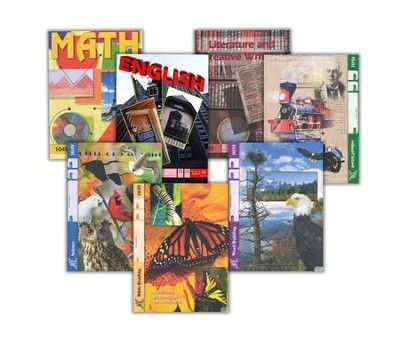
Assesment
Each PACE contains Checkups, which are mini-tests that cover a section of the PACE. If a student does not achieve mastery in an area, the Checkup will reveal that weak area. Students can then take time to review and learn those concepts with the help of their teacher.
After completing the activities and Checkups, students prepare to take the Self Test, which is a practice test. The Self Test allows students to evaluate their own readiness for the PACE Test. Once the Self Test is successfully completed, students hand in the PACE and take the PACE Test the following school morning.
The PACE Test is an objective measure of a student's mastery of the material. Students who successfully pass the PACE Test progress to the next PACE.
Life Skills Training
Students being their PACE work by noting their goals in their Planner (which is provided for them), the concepts they will learn, a Bible verse, and a corresponding character trait.
From the very beginning of each PACE, they know what is expected and they assume the responsibility for their own learning

Achievement
The A.C.E. program is designed around a new format: that of building skill upon skill. The scope and sequence ignores the concept of grade level and moves with continuous progress beginning with the first skill to be mastered. Depending on their ability and motivation levels, students may move ahead rapidly or take as long as necessary, but each student masters the material.
As the student moves upward, level after level, and moves into new concepts, he is far better prepared to learn because he has mastered the skill on the previous level. He does not advance until he has mastered each concept. The student is not lock-stepped with his classmates but is learning individually and completely before advancing. A.C.E. implements a unique and effective system
Elementary School
GRADES 2-5
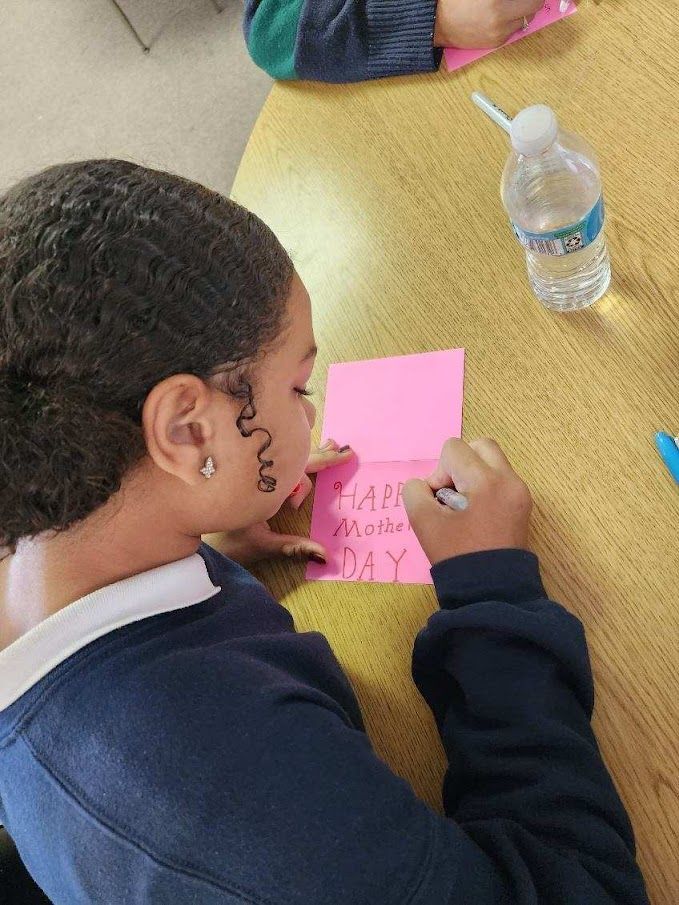
-
ABCs with Ace and Christi
A multisensory, phonetic, learning-to-read program designed to prepare a child for the individualized Learning-to-Read program. The programme encourages verbal and written communication through the use of games, songs, stories, poems and many other fun activities that young learners will enjoy.
-
Math
Basic Math skills are introduced, developed, mastered, reviewed and consistently reinforced in a variety of imaginative ways throughout the material and levels from Grade 1 to Grade 3.
-
English
The English curriculum develops optimal language skills through its balanced scope and sequence. Each level moves learners step by step, continually building on traditional grammar and usage concepts. Ongoing review and testing provide regular evaluation of learners' progress in thinking, reading and writing skills. Each unit integrates Biblical and character-building principles.
-
Word Building
Word Building is a vocabulary-controlled study of selected words, root words, prefixes, and suffixes, traditionally called spelling. Word Building is designed to build vocabulary, spelling skills as well as reading and writing. Children should be able to read even unfamiliar words and material when they have completed this programme.
-
Science
Science is knowledge based on observed facts and tested truths, presented in an orderly fashion. Science includes the study of plants, animals, biology, physical science, chemistry, and physics.
The curriculum for the foundation phase of Science covers concepts and principles which are expanded throughout all levels. The curriculum takes students' natural curiosity about their physical environment and helps them build a solid foundation upon Biblical principles.
-
Social Studies
Social Studies (Sciences) is the study of people, their activities, customs, and institutions in relationship to other people. Social Studies includes history, economics, geography, and government.
This course looks at world history and cultures from the perspective that God is the Designer, Creator, and Controller of the universe.
-
Bible Reading
Bible Reading reinforces reading skills and exposes young students to God’s Word. Each level of this series contains 12 PACEs that concentrate on reading the Bible and comprehending many of its principles.
-
Literature and Creative Writing
The A.C.E. Literature and Creative Writing course is designed for Grades 3 and up. This course is created to nurture a passion for reading and creative writing. Animated cartoon characters Ace, Christi, and their friends, lead students through foundational concepts of writing.
-
Animal Science
Children love to learn about animals. The Animal Science program encourages an interest in their habitats, special features, and physical characteristics. It takes young students on an adventure where they "meet" the members of an exciting animal family each time they open the cover of a new PACE. They learn about the animals' habitats, ranges, physical characteristics, and special features.
-
IOWA TESTING
The Iowa Assessments™ Form E Complete Battery (Iowa Complete) and the Cognitive Abilities Test™ (CogAT®) Form 7 measure how students are performing on nationwide standards. The Iowa Complete is a large-scale achievement test that assesses students’ skills in reading, language, mathematics, social studies, and science. The test measures both foundation skills and higher-order thinking skills. The CogAT evaluates the development of students’ reasoning abilities using verbal, quantitative, and nonverbal cognitive tasks. When the two are taken together, the scores are a valuable tool, relating a student’s actual achievement with his or her ability and providing a wealth of information to parents and school staff. The CogAT Form 7 is administered in Levels 2, 5, and 8.
Building A Strong Foundation
The Foundation Phase is the first three years of formal schooling. It is a crucial time for children to develop the basic knowledge and skills they need to succeed in school and in life.
During the Foundation Phase, children learn the basics of reading, writing, and mathematics. They also learn about science, social studies, and life skills. In addition, they develop their social and emotional skills.
It is important for children to receive support at home and at school during the Foundation Phase. Parents can help their children by reading to them, playing educational games with them, and providing them with a stimulating environment. Teachers can help children by providing them with individualized instruction and by creating a positive and supportive learning environment.
A strong foundation in the Foundation Phase is essential for children's success in school and in life. By providing children with the support they need, we can help them reach their full potential.
Middle School
GRADES 6-8
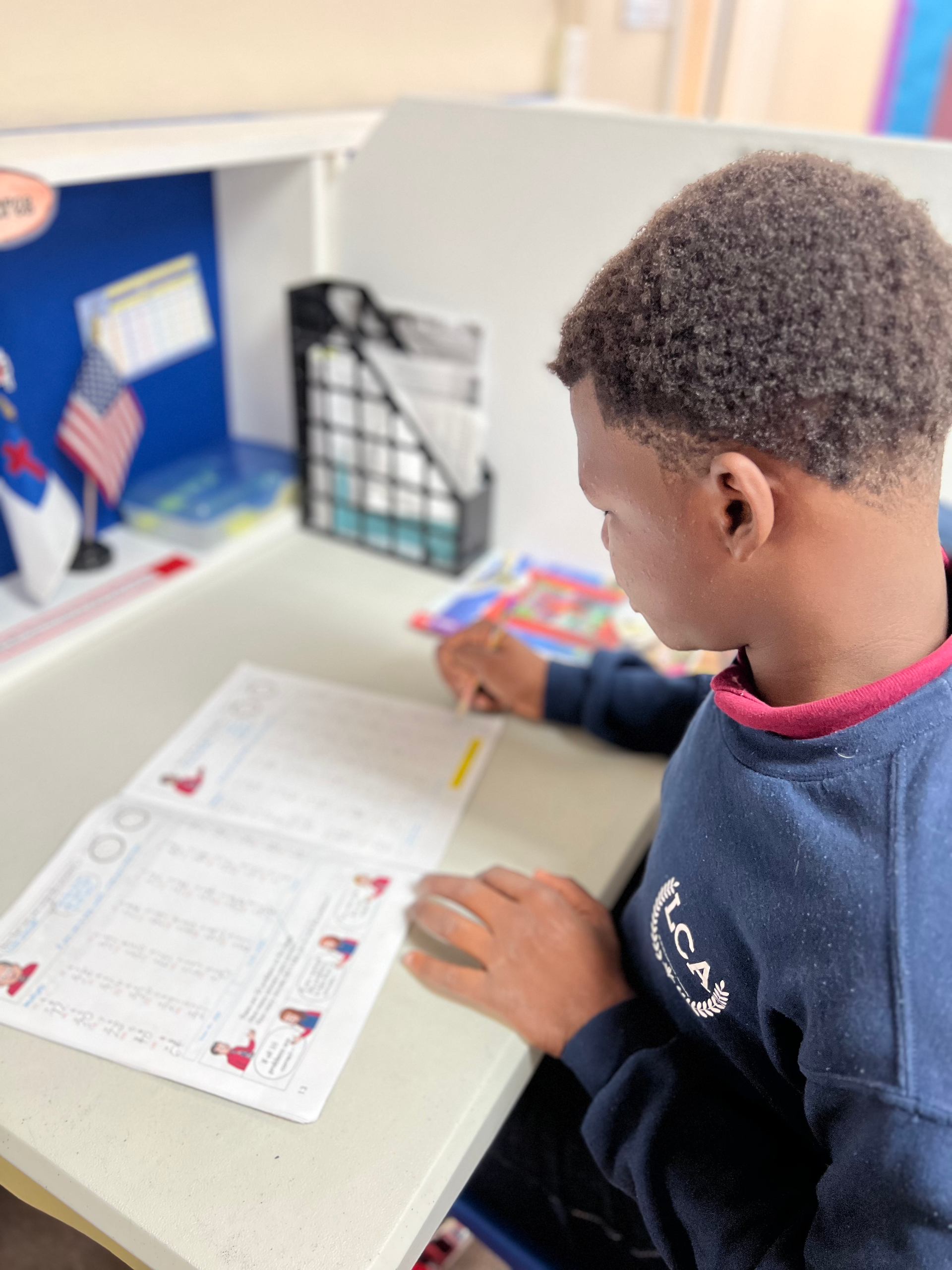
-
Math
Intermediate-phase students have an increased ability to learn and apply abstract thinking. This is a development process and preteens are not able to make all intellectual leaps, such as inferring a motive or reasoning hypothetically. Interpretative abilities develop during the intermediate phase as does the ability to recognize cause and effect sequences.
Mathematics is an essential subject that promotes critical thinking, mathematical problem solving, skills in building logical strategy, the development of algebraic thinking, and many other skills that are used to enhance success in the working environment and everyday life.
-
English
The English language curriculum and learning materials are thorough and designed to prepare the student with solid understanding and application skills required for the senior phase of education.
-
Word Building
During the entire intermediate phase, students complete a total of 36 Word Building PACEs. Each PACE presents a vocabulary of 50 news words. That equates to 1800 new words.
Students are required to learn spellings using phonics, learn meanings, use the words in sentences, read and sound out the words, identify root words, and change words from one part of speech into another part of speech (for example nouns to verbs). In addition, grade 6 students are required to work with the prefixes, stems, and suffixes/extensions to form other words. They also explore the origin of words.
DEVELOPING COMMUNICATION SKILLS
Students in the intermediate phase must be encouraged and given multiple opportunities to intentionally develop interpersonal communication skills.
-
Social Studies
The subject of Social Studies consists of History and Geography: History is the study of change and development in society over time. It is important to be able to place events in the order in which they happened in time and to consider their context. Timelines are often used to develop this concept.
Geography is the study of the human and physical environment. Geography examines both physical and human processes over space and time. Geography helps us to understand our complex world. It offers us a bridge between the human and physical sciences.
-
Natural Science
Science involves more than gaining knowledge. It is a systematic and organized inquiry into the natural world and its phenomena. Science is about gaining a deeper and often useful understanding of the world. Students study how the principles apply to God's physical creation and to everyday life.
Most people probably realize that understanding science is important - at least for scientists - but scientists, as well as members of the public, may not fully appreciate the importance of understanding the Nature of Science (NOS) - that is, the nature of scientific knowledge and the processes that generate it.
-
Bible Reading
This subject is central to the holistic development of learners. It addresses skills, knowledge, and values for the personal, social, intellectual, emotional, and physical growth of students, and is concerned with the way in which these facets are interrelated. Students are equipped for meaningful and successful living in a rapidly changing and transforming society.
In all of the levels, Students discuss and answer age-appropriate questions about the Bible while learning more of the great character traits.
-
Literature and Creative Writing
Studies have shown that children who develop good reading and writing skills tend to do better socially and academically. This is due to the fact that reading literature and creative writing stimulates the development of skills such as planning, idea dissection, critical thinking, persuasion, and problem-solving. Children immerse themselves in a storyline and work through a sense of reality which often leads to self-analysis and self-awareness.
In addition, creative writing allows the child to explore new concepts and ideas as well as ways to communicate at a higher level.
During the intermediate phase, the curriculum covers the following concepts and competencies in the respective grades.
-
IOWA TESTING
The Iowa Assessments™ Form E Complete Battery (Iowa Complete) and the Cognitive Abilities Test™ (CogAT®) Form 7 measure how students are performing on nationwide standards. The Iowa Complete is a large-scale achievement test that assesses students’ skills in reading, language, mathematics, social studies, and science. The test measures both foundation skills and higher-order thinking skills. The CogAT evaluates the development of students’ reasoning abilities using verbal, quantitative, and nonverbal cognitive tasks. When the two are taken together, the scores are a valuable tool, relating a student’s actual achievement with his or her ability and providing a wealth of information to parents and school staff. The CogAT Form 7 is administered in Levels 2, 5, and 8.
A Time of Growth and Change
The Intermediate Phase of learning in the U.S. education system is from grades 6 to 8 (ages 11-13). During this phase, students are exposed to specific subject content, while also developing their social, emotional, intellectual, and physical skills. This is a time of great exploration and growth for students, as they begin to form their own unique identities and opinions.
There are many factors that influence a student's development during the Intermediate Phase, including encouragement, teaching, discipline, and behavior modeling. It is important for students to have positive role models who can help them develop good habits and values.
The transition from the Foundation Phase to the Intermediate Phase can be challenging for some students, especially if they have to change schools. It is important for students to develop organizational skills, time management skills, self-discipline, and communication skills during this phase. These skills will help them succeed in school and in life.
It is critical that all students have access to learning environments that emphasize morals and values. These values can help students make good choices and become productive members of society.
High School
GRADES 9-12
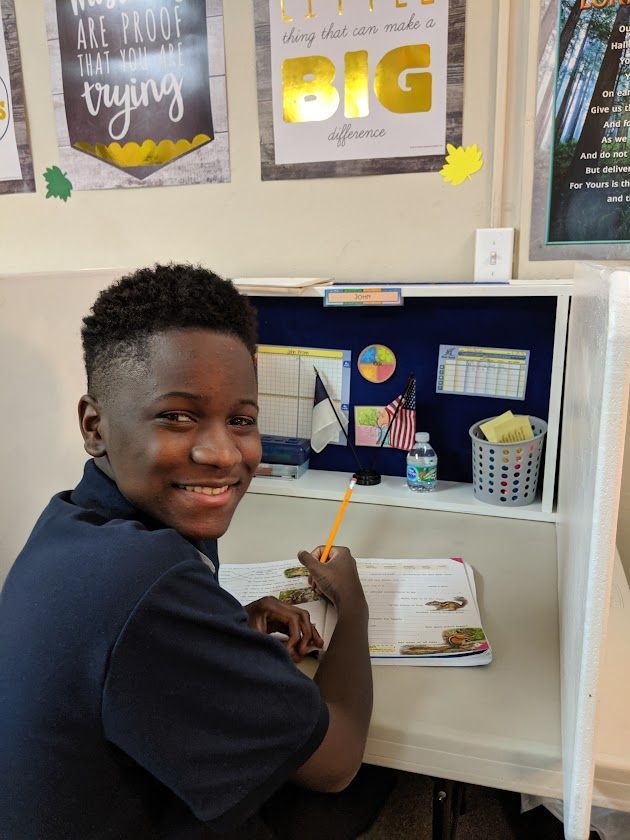
-
Math
Mathematics forms a fundamental part of our daily living and encourages logical reasoning and mental rigor. It is an essential subject that promotes critical thinking, mathematical problem solving, spatial thinking, skills in building logical strategy, the development of algebraic thinking creativity, and effective communication skills to enhance success in the working environment and everyday life.
-
English
English in high school continues to build on the solid foundations that have been laid in the Middle school Phase. The English language is a tool for thought and communication which effectively enables students to gain knowledge, express their feelings and ideas, interact with others, and manage their domain. Learners apply concepts, and deepen their understanding of the language to make better sense of the world they live in.
-
Word Building
Word Building is a vocabulary-controlled study of selected words, root words, prefixes, and suffixes, traditionally called spelling. Word Building is designed to build vocabulary, spelling skills as well as reading and writing. Children should be able to read even unfamiliar words and material when they have completed this programme.
-
Social Studies
The subject of Social Sciences consists of History and Geography: History is the study of change and development in society over time. It is important to be able to place events in the order in which they happened in time and to consider their context. Timelines are often used to develop this concept.
Geography is the study of the human and physical environment. Geography examines both physical and human processes over space and time. Geography helps us to understand our complex world. It offers us a bridge between the human and physical sciences.
-
Florida State History
State History curriculum takes the students on a journey and encourages them to think about the past, which affects the present, in a disciplined way.
The student is thought to understand historical concepts, including historical sources and evidence which creates an appreciation of the past and the forces that shaped it.
-
Sciences
The science curriculum is taught from a Christian perspective and emphasizes the importance of integrating faith and science. Students are encouraged to explore the natural world and to ask questions about how it works. They are also taught to think critically about scientific evidence and to communicate their findings effectively. We do this through the Earth Science, Biology, Physical Science, and Chemistry.
The high school science curriculum is taught using a variety of methods, including textbooks, workbooks, laboratory activities, and field trips. Students are also encouraged to participate in science fairs and other extracurricular activities.
-
Biblical Studies
This subject is central to the holistic development of learners. It addresses skills, knowledge, and values for the personal, social, intellectual, emotional, and physical growth of students, and is concerned with the way in which these facets are interrelated. Students are equipped for meaningful and successful living in a rapidly changing and transforming society.
In all of the levels, Students discuss and answer age-appropriate questions about the Bible while learning more of the great character traits.
-
Business Studies
Business Studies provides the student with essential business knowledge, skills, and principles to productively and profitably conduct business in changing business environments.
-
Electives
There are several different electives available, including Accounting, Art, Computer Science, Drama, Foreign Language, Geography, Health, Music, Physical Education, and Speech. Just to name a few...
The electives are designed to complement the core curriculum and provide students with opportunities to explore their interests and develop their skills.
The electives are also aligned with the Common Core State Standards, so students can be confident that they are learning the material they need to succeed in college and beyond.
-
IOWA TESTING
The Iowa Assessments™ Form E Complete Battery (Iowa Complete) and the Cognitive Abilities Test™ (CogAT®) Form 7 measure how students are performing on nationwide standards. The Iowa Complete is a large-scale achievement test that assesses students’ skills in reading, language, mathematics, social studies, and science. The test measures both foundation skills and higher-order thinking skills. The CogAT evaluates the development of students’ reasoning abilities using verbal, quantitative, and nonverbal cognitive tasks. When the two are taken together, the scores are a valuable tool, relating a student’s actual achievement with his or her ability and providing a wealth of information to parents and school staff. The CogAT Form 7 is administered in Levels 2, 5, and 8.
Prepping For The Future
The final four years of our program, Grades 9-12, provide students with a comprehensive education that prepares them for life after high school.
During these years, students continue to develop their academic skills in core subjects such as English, math, science, and social studies. They also have the opportunity to explore their interests and talents through elective courses and extracurricular activities. In addition, students receive career-oriented education and training that can help them prepare for their chosen field of work.
The final four years of high school are a critical time for students as they begin to transition from adolescence to adulthood. Our program provides them with the support and resources they need to succeed in college, the workforce, and life in general.
Course of Study for High School
Lighthouse Christian Academy (LCA) offers four diplomas for high school students. These Course of Studies are recommended for most students.
When choosing a course of study, students should consider the entrance requirements for the college they plan to attend. College admission is ultimately the responsibility of the student.
A minimum of six credit hours must be earned through Lighthouse Christian Academy preceding graduation.
High school Diplomas
MINIMUM OF 25 CREDITS
Minimum of 27 credits
Must have a 94 percent average and score at least a 22 on the ACT or 1100 for the Evidence-Based Reading and Writing and Math scores combined on the SAT.
This course of study is designed to prepare students for college-level work. It includes a rigorous academic curriculum in English, math, science, social studies, and foreign language.
Honors
College Preparatory
Other High school Diplomas
MINIMUM OF 24 CREDITS
MINIMUM OF 22 CREDITS
This course of study is designed for students who are undecided about their future plans. It includes a general education curriculum that provides students with a broad foundation of knowledge.
This course of study is designed to prepare students for college-level work. It includes a rigorous academic curriculum in English, math, science, social studies, and foreign language.
General
Vocational
Dual Enrollment for High School
Broward County Public Schools have partnered with Broward College and Florida Atlantic University to provide eligible students opportunities in college courses while in high school.
-
BROWARD COLLEGE
Important Information Regarding Coronavirus
Visit Broward College's Coronavirus page for updated information:
http://www.broward.edu/Pages/coronavirus.aspx
Dual Enrollment Program Information
Cost
There is no cost to qualifying students for required books or tuition.
Initial Eligibility Requirements
- Must be enrolled as a Broward County School student
- Minimum 3.0 unweighted high school grade point average (GPA)
- Qualifying scores on SAT, ACT, or PERT exam, Accuplacer Next Gen Exam
Continued Eligibility Requirements
- Completed Dual Enrollment Recommendation form for each term signed by parent/legal guardian, student, and school counselor.
- Maintain a 3.0 unweighted GPA in high school academic work
- Maintain a 2.0 Broward College GPA
- Earn a grade of a "C" or better in each college-level course
- Dual Enrolled students who receive a "D" or "F" grade are no longer eligible to participate in the program
Registration Deadline
Visit www.broward.edu/dual for deadlines on each term or check with your school counselor.
For more information regarding Dual Enrollment with Broward College, visit www.broward.edu/dual
-
FLORIDA ATLANTIC UNIVERSITY
Important Information Regarding Coronavirus
Visit Broward College's Coronavirus page for updated information:
https://www.fau.edu/coronavirus/
Dual Enrollment Program Information
Cost
There is no cost to qualifying students for required books or tuition.
Eligibility Requirements
- Must be registered as a sophomore, junior, or senior with Broward County Public Schools.
- Must receive approval from high school Guidance Counselor
- 3.0 unweighted cumulative high school grade point average (G.P.A.)
- Meet the minimum scores for ACT, SAT, CPT/Accuplacer, or P.E.R.T. Click here for more information on test score requirements.
Continued Eligibility Requirements
- Earn a C (2.0) or higher in each FAU course
- Maintain a 3.0 unweighted high school GPA
- Submit the completed permission form to the assigned BCPS guidance counselor.
Registration Deadline
Visit www.fau.edu/registrar/dual-enrollment for deadlines on each term or check with your school counselor.
For more information regarding Dual Enrollment with FAU, visit www.fau.edu/registrar/dual-enrollment/
Graduation Ceremony
The LCA graduation ceremony is a formal event held each spring to celebrate the accomplishments of the graduating seniors.
The ceremony features graduates in caps and gowns, a special guest commencement speaker, and an opportunity for graduates to meet their Lighthouse Christian Academy staff.
The graduation ceremony is a special event that marks the end of one chapter and the beginning of another. It is a time to celebrate the hard work and accomplishments of the graduating seniors, and to look forward to the future.


Graduation Requirements
To graduate from Lighthouse Christian Academy (LCA), students must meet the following requirements:
- Earn a minimum of six credit hours through LCA.
- Complete a minimum of six months of enrollment at LCA.
- Meet all LCA graduation requirements as indicated on the LCA Academic Projection.
- Fulfill all financial obligations.
- For students participating in the Dual Enrollment program, attend a school that has attained Model or Quality Status for at least their junior and senior years. Some exceptions may apply.
Students who meet all of these requirements will receive diploma from LCA and will have the option to request an official transcript be sent to other schools and colleges after graduation.
Educational Support Programs
Available to ALL GRADES

Florida Virtual School
FLVS is a public online school that offers over 120 courses for students in middle school through high school. FLVS courses are taught by certified teachers and are just as rigorous as traditional brick-and-mortar courses. FLVS is a great option for high school students who want to take on extra credits on their own schedule. Students can also build an educational plan that fits their unique scheduling needs and living situation. Students on scholarships will have limitations.
- Flexibility: FLVS students can learn at their own pace and on their own schedule.
- Convenience: FLVS students can take classes from anywhere with an internet connection.
- Cost-effectiveness: FLVS is a tuition-free public school.
- Quality: FLVS courses are taught by certified teachers and are just as rigorous as traditional brick-and-mortar courses.
If you are interested in learning more about FLVS, please visit www.flvs.org
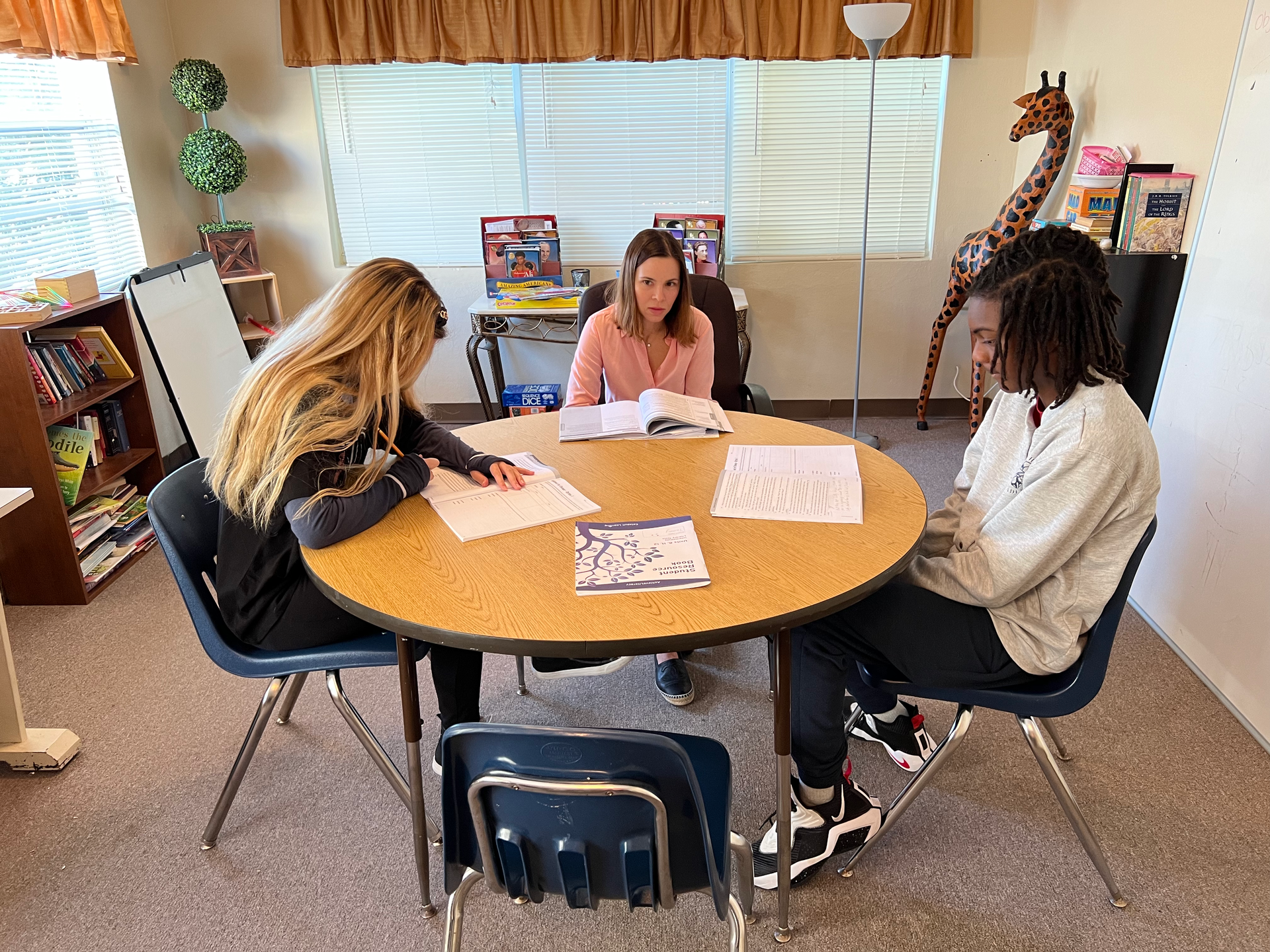
All Title I services are designed to help students improve their academic achievement and these services can be a valuable resource for students who are struggling academically. If your student is struggling, or if you know a student who is struggling, talk to our staff at LCA about Title I services and how you can sign up. You can learn more about Title I by visiting,
https://www.fldoe.org/policy/federal-edu-programs/title-i-part-a-improving-the-academic-/
Title I
Title 1 is a free pull out program where students receive Reading and Math intervention services. Eligibility is based on where the student lives along with teacher recommendation or grades. Here are some highlights of the program:
- Assessment: Each student is given a grade level assessment to receive a personalized education plan. This assessment helps the Title I teacher identify the student's strengths and weaknesses, and develop a plan to address their needs.
- Instruction: Title I teachers use a research-based curriculum to provide direct instruction to students. The curriculum is designed to help students master the skills they need to succeed in school.
- Collaboration: Title I teachers work collaboratively with the classroom teacher to reinforce what is being taught. This ensures that students are getting the support they need in all areas of their academic development.
- Small groups: Title I groups are no more than 5 students. This allows the Title I teacher to provide individualized attention to each student.

To apply or for more information, please visit the Exceptional Student Education Division directly.
Exceptional Student Education
Exceptional Student Education Division staff provides professional learning opportunities and instructional programming to facilitate high quality instruction for students with disabilities.
- Speech and/or Language Services provided at Broward County Public School sites after school hours
- Academic instruction for reading and/or mathematics for up to 2 hours a week in the private school from a certified Broward County Public School teacher
- Consultation services to private school teachers and parents for up to one hour a month
- Reevaluation every 3 years
